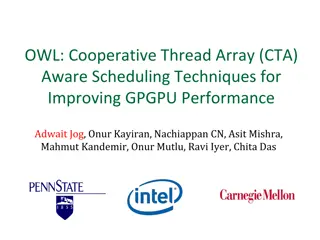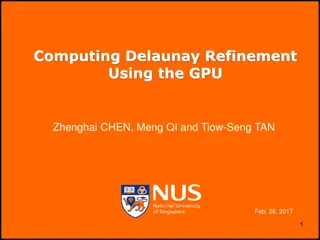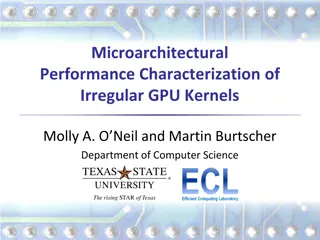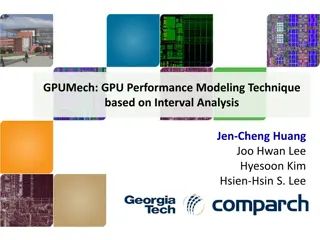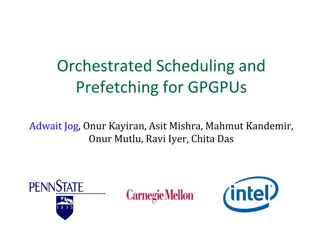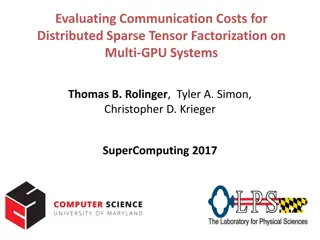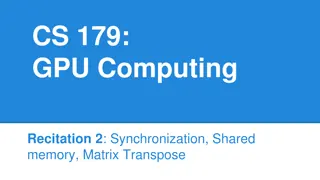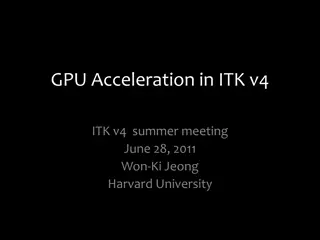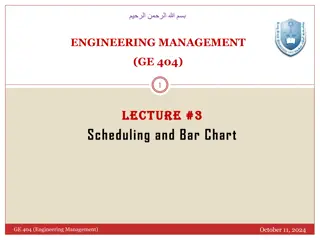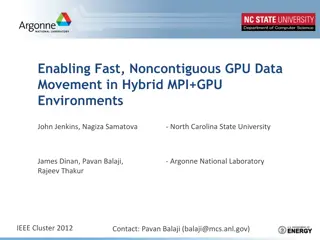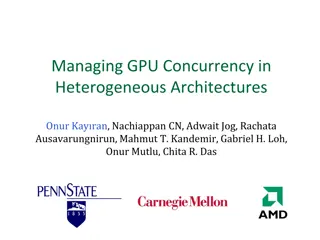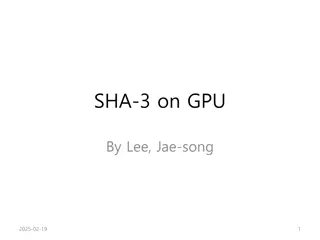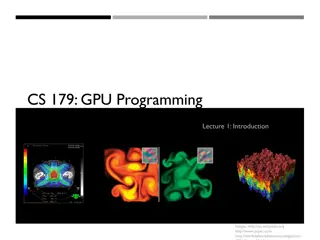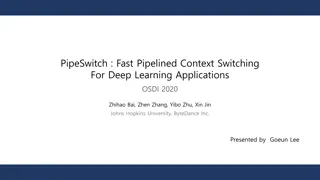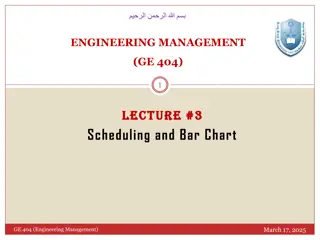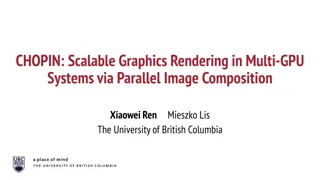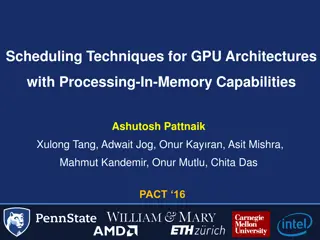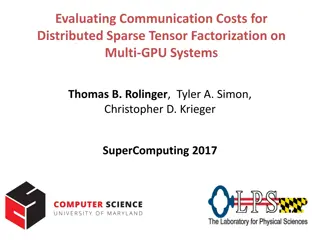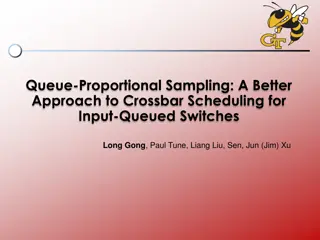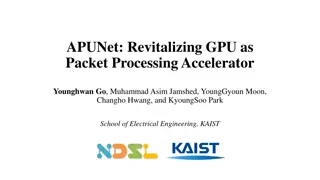GPU Scheduling Strategies: Maximizing Performance with Cache-Conscious Wavefront Scheduling
Explore GPU scheduling strategies including Loose Round Robin (LRR) for maximizing performance by efficiently managing warps, Cache-Conscious Wavefront Scheduling for improved cache utilization, and Greedy-then-oldest (GTO) scheduling to enhance cache locality. Learn how these techniques optimize GP
4 views • 21 slides
Scheduling Algorithms in Operating Systems
Exploring the world of scheduling in operating systems, this content covers various aspects such as introduction to scheduling, process behavior, bursts of CPU usage, CPU-bound and I/O-bound processes, when to schedule processes, and the differences between non-preemptive and preemptive scheduling a
5 views • 34 slides
Improving GPGPU Performance with Cooperative Thread Array Scheduling Techniques
Limited DRAM bandwidth poses a critical bottleneck in GPU performance, necessitating a comprehensive scheduling policy to reduce cache miss rates, enhance DRAM bandwidth, and improve latency hiding for GPUs. The CTA-aware scheduling techniques presented address these challenges by optimizing resourc
2 views • 33 slides
GPU-Accelerated Delaunay Refinement: Efficient Triangulation Algorithm
This study presents a novel approach for computing Delaunay refinement using GPU acceleration. The algorithm aims to generate a constrained Delaunay triangulation from a planar straight line graph efficiently, with improvements in termination handling and Steiner point management. By leveraging GPU
21 views • 23 slides
Microarchitectural Performance Characterization of Irregular GPU Kernels
GPUs are widely used for high-performance computing, but irregular algorithms pose challenges for parallelization. This study delves into the microarchitectural aspects affecting GPU performance, emphasizing best practices to optimize irregular GPU kernels. The impact of branch divergence, memory co
3 views • 26 slides
Advanced GPU Performance Modeling Techniques
Explore cutting-edge techniques in GPU performance modeling, including interval analysis, resource contention identification, detailed timing simulation, and balancing accuracy with efficiency. Learn how to leverage both functional simulation and analytical modeling to pinpoint performance bottlenec
1 views • 32 slides
Orchestrated Scheduling and Prefetching for GPGPUs
This paper discusses the implementation of an orchestrated scheduling and prefetching mechanism for GPGPUs to enhance system performance by improving IPC and overall warp scheduling policies. It presents a prefetch-aware warp scheduler proposal aiming to make a simple prefetcher more capable, result
4 views • 46 slides
Communication Costs in Distributed Sparse Tensor Factorization on Multi-GPU Systems
This research paper presented an evaluation of communication costs for distributed sparse tensor factorization on multi-GPU systems. It discussed the background of tensors, tensor factorization methods like CP-ALS, and communication requirements in RefacTo. The motivation highlighted the dominance o
4 views • 34 slides
GPU Acceleration in ITK v4 Overview
This presentation by Won-Ki Jeong from Harvard University at the ITK v4 winter meeting in 2011 discusses the implementation and advantages of GPU acceleration in ITK v4. Topics covered include the use of GPUs as co-processors for massively parallel processing, memory and process management, new GPU
5 views • 33 slides
GPU Computing and Synchronization Techniques
Synchronization in GPU computing is crucial for managing shared resources and coordinating parallel tasks efficiently. Techniques such as __syncthreads() and atomic instructions help ensure data integrity and avoid race conditions in parallel algorithms. Examples requiring synchronization include Pa
4 views • 22 slides
GPU Acceleration in ITK v4: Overview and Implementation
This presentation discusses the implementation of GPU acceleration in ITK v4, focusing on providing a high-level GPU abstraction, transparent resource management, code development status, and GPU core classes. Goals include speeding up certain types of problems and managing memory effectively.
3 views • 32 slides
Insights into Volunteer Scheduling and Management
Exploring the intricacies of volunteer scheduling, this informative guide covers topics such as creating schedule slots, weighing the pros and cons of scheduling, opportunity scheduling, monthly calendars, slot summaries, volunteer and opportunity listings, and more. Dive into the world of volunteer
3 views • 21 slides
Overview of Project Scheduling in Engineering Management
The lecture covers planning and scheduling in engineering management, focusing on activity and event scheduling techniques, bar charts, critical path analysis, and addressing project scheduling principles. It discusses the objectives of the lecture, the difference between planning and scheduling, th
0 views • 29 slides
Fast Noncontiguous GPU Data Movement in Hybrid MPI+GPU Environments
This research focuses on enabling efficient and fast noncontiguous data movement between GPUs in hybrid MPI+GPU environments. The study explores techniques such as MPI-derived data types to facilitate noncontiguous message passing and improve communication performance in GPU-accelerated systems. By
4 views • 18 slides
Managing GPU Concurrency in Heterogeneous Architectures
When sharing the memory hierarchy, CPU and GPU applications interfere with each other, impacting performance. This study proposes warp scheduling strategies to adjust GPU thread-level parallelism for improved overall system performance across heterogeneous architectures.
2 views • 36 slides
Implementing SHA-3 Hash Submissions on NVIDIA GPU
This work explores implementing SHA-3 hash submissions on NVIDIA GPU using the CUDA framework. Learn about the benefits of utilizing GPU for parallel tasks, the CUDA framework, CUDA programming steps, example CPU and GPU codes, challenges in GPU debugging, design considerations, and previous works o
3 views • 26 slides
GPU Programming Lecture: Introduction and Course Details
This content provides information about a GPU programming lecture series covering topics like parallelization in C++, CUDA computing platform, course requirements, homework guidelines, project details, and machine access for practical application. It includes details on TA contacts, class schedules,
1 views • 24 slides
PipeSwitch: Fast Pipelined Context Switching for DL Applications
PipeSwitch is a solution presented in OSDI 2020, aiming to enable GPU-efficient multiplexing of deep learning applications with fine-grained time-sharing. It focuses on achieving millisecond-scale context switching latencies and high throughput by optimizing GPU memory allocation and model transmiss
2 views • 26 slides
GPU Programming Primitives for Computer Graphics
This book covers advanced topics in GPU programming for computer graphics, including parallel reduction, prefix scan, programming primitives, linear probing, radix sort, and code optimization. It delves into the motivation behind leveraging thousands of threads on GPUs and addresses various challeng
3 views • 85 slides
Operating Systems Scheduling Processes Overview
This content provides an overview of operating systems scheduling processes, focusing on the Process Control Block (PCB), scheduling decisions, scheduler function, evaluation criteria, scheduling policies, and goal considerations in CPU scheduling.
4 views • 33 slides
GPU Architecture Research Beyond Assigned Readings
Dive into advanced GPU architecture research topics including mitigating SIMT control divergence, performance vs. warp size in applications, dynamic warp formation, and hardware implementations. Explore how innovations such as virtualized deep neural networks and multi-chip module GPUs are transform
4 views • 58 slides
Effective Project Scheduling for Engineering Management Students
This lecture on project scheduling in Engineering Management covers the importance of planning and scheduling, techniques like bar charts and critical path analysis, and key considerations such as resource allocation and project duration. The content discusses the difference between planning and sch
1 views • 29 slides
Gem5-GPU Installation Guide for Advanced Computer Architecture
This comprehensive guide provides step-by-step instructions on setting up the Gem5-GPU environment on Ubuntu 14.04 LTS 64-bit platform. It covers essential packages installations, CUDA toolkit setup, gem5 and GPGPU-Sim cloning, and building the gem5-gpu code. By following these instructions, users c
2 views • 14 slides
Optimizing Multi-GPU Graphics Rendering Through Parallel Image Composition
Explore how CHOPIN enhances graphics rendering in multi-GPU systems by leveraging parallel image composition to eliminate bottlenecks and improve performance by up to 56%. Understand the significance of inter-GPU synchronization in generating high-quality images and overcoming limitations such as re
3 views • 19 slides
Techniques for GPU Architectures with Processing-In-Memory Capabilities
Explore scheduling techniques for GPU architectures with processing-in-memory capabilities to enhance energy efficiency and performance. Delve into the challenges, advancements, and future prospects in the era of energy-efficient architectures. Identify bottlenecks such as off-chip transactions affe
0 views • 38 slides
Communication Costs for Distributed Sparse Tensor Factorization on Multi-GPU Systems
Evaluate communication costs for distributed sparse tensor factorization on multi-GPU systems in the context of Supercomputing 2017. The research delves into background, motivation, experiments, results, discussions, conclusions, and future work, emphasizing factors like tensors, CP-ALS, MTTKRP, and
5 views • 34 slides
Queue-Proportional Sampling: A Better Approach to Crossbar Scheduling
Learn about Queue-Proportional Sampling, a new approach to crossbar scheduling for input-queued switches. Explore the proposed algorithm, simulation results, and conclusions presented in the research paper. Understand the challenges and constraints associated with scheduling for input-queued crossba
2 views • 45 slides
CPU Scheduling in Operating Systems
Learn about the importance of CPU scheduling in operating systems, the different scheduling schemes, criteria for comparing scheduling algorithms, and popular CPU scheduling algorithms like FCFS and SJF.
0 views • 21 slides
CPU Scheduling in Operating Systems
Understand the basic concepts of CPU scheduling in operating systems, including multiprogramming, CPU/I/O burst cycles, and preemptive scheduling. Explore the differences between I/O-bound and CPU-bound programs, and learn about scheduling strategies to maximize CPU utilization. Discover how preempt
2 views • 40 slides
Greedy Algorithms for Scheduling Theory in CSE 417
Dive into the concepts of Greedy Algorithms and Scheduling Theory in CSE 417. Explore topics like Interval Scheduling, Topological Sort Algorithm, and the application of Greedy Algorithms for task scheduling. Enhance your understanding with examples and simulations to solve complex scheduling proble
2 views • 24 slides
Scheduling Algorithms in Operating Systems
Scheduling in operating systems involves interleaving the execution of processes to optimize CPU utilization and response time. The scheduler determines which processes will run, when they will run, and for how long. Various scheduling algorithms are used to achieve different criteria such as minimi
0 views • 21 slides
GPU Programming Lecture 7: Memory Optimizations and GPU Reductions
This lecture delves into memory optimizations using different GPU caches, atomic operations, synchronization techniques, and advanced GPU-accelerated algorithms such as reductions for parallelizing non-intuitively parallelizable problems. Explore reductions for GPUs, properties of reduction operator
3 views • 45 slides
Revitalizing GPU for Packet Processing Acceleration
Explore the potential of GPU-accelerated networked systems for executing parallel packet operations with high power and bandwidth efficiency. Discover how GPU benefits from memory access latency hiding and compare CPU vs. GPU memory access hiding. Uncover the contributions of GPUs in packet processi
4 views • 22 slides
Stride Scheduling for Resource Management
Explore the concepts of Stride Scheduling for deterministic proportional-share resource management introduced by Carl A. Waldspurger and William E. Weihl. Learn about its basic algorithm, client variables, and advantages over other scheduling methods such as Lottery Scheduling. Dive into the world o
4 views • 18 slides
Managing GPU Concurrency in Heterogeneous Architectures
This study delves into managing GPU concurrency in heterogeneous architectures, delving into LLC memory, network, and shared resources, improving GPU and CPU performance through warp scheduler controls, CPU-centric and CPU-GPU balanced strategies. Results show positive impacts on CPU performance whi
1 views • 16 slides
Optimal Job Scheduling Techniques
This content explores various job scheduling scenarios, including job-shop scheduling, training matrix scheduling, and hospital sequencing. It discusses sequencing jobs on machines to minimize completion times, analogous to training schedules, and patient diagnostics in hospitals. Additionally, it c
3 views • 15 slides
Scheduling Proposal for mmWave Distribution Networks
Explore the details of a scheduling proposal for mmWave distribution networks outlined in a document from September 2017. The document covers key concepts such as network topology, TDD timing, scheduling and assignment mechanisms, and an overall scheduling framework. Various slides illustrate essent
4 views • 24 slides
Understanding GPU Architecture and CUDA Development
Explore the fundamentals of GPU architecture, CUDA setup, and development without a PhD. Learn about the advantages of massively parallel processing and how to leverage GPU memory for efficient data processing. Dive into the world of GPU-based applications and see immediate benefits without extensiv
1 views • 34 slides
Accelerated Image Processing with GPU Technology
Efficiently process large pathology images using GPU acceleration. Utilize CUDA functions for memory-efficient batch-wise processing and integration with Python for orchestration. Explore the pipeline overview and GPU acceleration techniques in detail. Get insights into the dataset statistics and th
4 views • 12 slides
Principles of Operating Systems CPU Scheduling
Explore the fundamental concepts of CPU scheduling in operating systems, including scheduling objectives, algorithms, and behaviors. Learn about levels of scheduling, scheduling criteria, and evaluation methods for real-time scheduling. Delve into CPU burst distribution, program behavior issues, and
7 views • 37 slides


